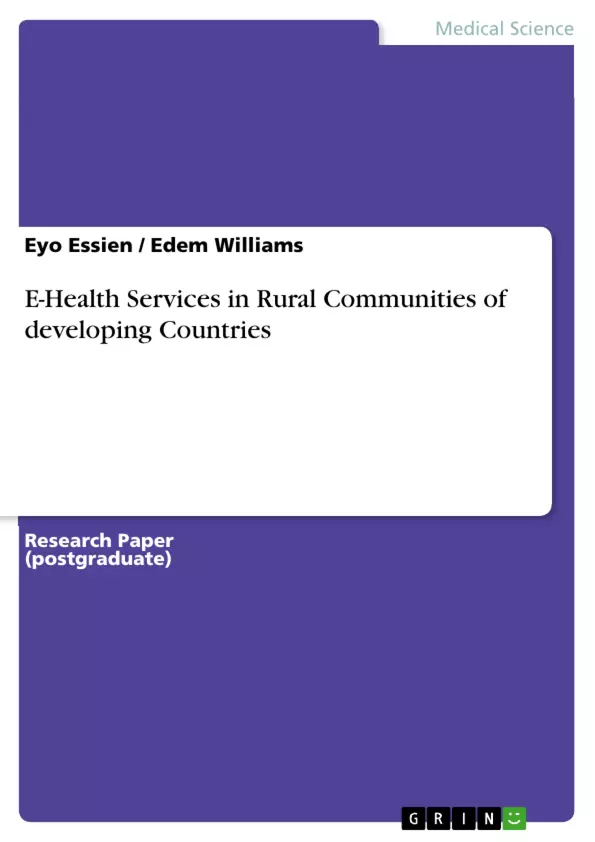Health service delivery to rural communities has always been a vexed problem for most governments in developing countries. Several factors impeding the success of government programmes in this sub-sector include corruption, inadequate supply of drugs, paucity and/poor quality of medical personnel, lack of medical equipment and facilities, cost (transportation to the hospital, medical bills) to the patients of obtaining medical attention and interference by unorthodox medical practitioners. This paper surveys the problems that inhibit provision of adequate preventive and curative health care to rural communities and suggests affordable and sustainable ways in which ICT can be used to solve these problems. Special emphasis is given to use of ICT for public enlightenment for preventive health care and also for the implementation of affordable access to curative health care.
Inhaltsverzeichnis (Table of Contents)
- Abstract
- Introduction
- Aims and Objectives
- Characteristics of human health conditions in rural developing countries
- Components of ICT
- Application of ICT
- Tele-clinics
Zielsetzung und Themenschwerpunkte (Objectives and Key Themes)
This research aims to develop healthy and economically productive rural citizenship through facilitating affordable, reliable and high-quality health information to the rural poor using ICT.
- Providing emergency healthcare to the rural poor
- Ensuring safe delivery and motherhood in rural areas
- Providing access to health information and making it accessible to the poor
- Facilitating quality medical care to the poor in remote rural villages
- Bridging the gap of professional isolation
Zusammenfassung der Kapitel (Chapter Summaries)
- Abstract: The paper explores the challenges of providing health services to rural communities in developing countries and proposes ICT-based solutions for improving access to preventive and curative healthcare.
- Introduction: The introduction highlights the disparities in healthcare access between rural and urban communities in developing countries, emphasizing the need for innovative solutions to address these inequalities. It discusses the specific challenges faced by rural communities, such as poverty, limited access to healthcare facilities, and a shortage of healthcare professionals.
- Aims and Objectives: The research aims to leverage ICT to enhance healthcare access and quality for rural populations, with specific objectives focused on providing emergency care, ensuring safe motherhood, promoting access to health information, and facilitating quality medical care.
- Characteristics of human health conditions in rural developing countries: This section uses Nigeria as a case study to illustrate the challenges of healthcare provision in rural areas of developing countries. It highlights the shortage of medical care facilities, drug scarcity, and the high mortality and morbidity rates prevalent in rural regions, particularly concerning maternal and child health.
- Components of ICT: This section provides an overview of ICT and its potential applications in healthcare, classifying ICT components into computing, communication, and internet-enabled communication and computing.
- Application of ICT: This section explores the role of ICT in providing quality and cost-effective healthcare to the rural poor, emphasizing the potential of telemedicine and the need for appropriate and user-friendly technology solutions to address existing technology illiteracy.
- Tele-clinics: This section introduces the concept of tele-clinics as a telephone-enabled network connecting rural communities, trained health workers, and medical professionals, facilitating communication and providing access to medical expertise.
Schlüsselwörter (Keywords)
This research paper primarily focuses on the use of ICT for improving healthcare delivery in rural communities, specifically addressing issues of access, quality, and affordability. Key concepts and topics explored include tele-clinics, telemedicine, health information systems, public enlightenment, ambulance service support systems, and addressing technology illiteracy within rural populations.
Frequently Asked Questions
How can ICT improve healthcare in rural areas of developing countries?
ICT can facilitate tele-clinics, provide emergency health information, and bridge the gap of professional isolation for medical personnel.
What are the main barriers to rural health delivery?
Major barriers include poverty, shortage of medical staff, lack of equipment, drug scarcity, and technology illiteracy.
What is a tele-clinic?
A tele-clinic is a telephone-enabled network connecting rural communities with trained health workers and urban medical professionals.
Why is preventive healthcare focus important in these regions?
Preventive care through public enlightenment is more affordable and sustainable than curative care in resource-limited settings.
How does ICT support maternal and child health?
ICT-enabled systems can ensure safer delivery and motherhood by providing timely access to expert medical advice during emergencies.
- Quote paper
- Eyo Essien (Author), Edem Williams (Author), 2009, E-Health Services in Rural Communities of developing Countries, Munich, GRIN Verlag, https://www.grin.com/document/158436



